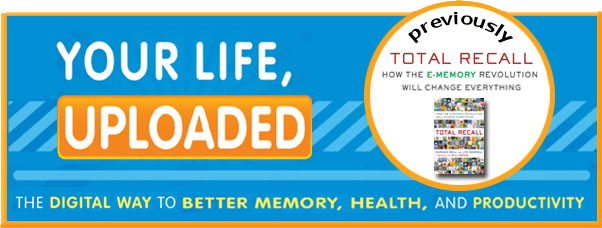The Quantified Self http://www.quantifiedself.com/
 Sunday, November 29, 2009 at 3:23PM
Sunday, November 29, 2009 at 3:23PM The Quantified Self http://www.quantifiedself.com/ is a group engaged in activities that are more or less defined by its name. The activities include Show and Tell Meetings, blogs and discussions of apps for quantifying self by tracking goals, measuring office productivity or what your eat, etc.. I see the site and activities as being completely aligned with Total Recall. The QS implies capturing and recording everything, but it goes beyond what Gemmell and I describe, by using the data for conducting experiments and for control. For example, one QS experiment was about the effects of her caffeine consumption on productivity--data coming right from tools we advocate in Total Recal. So we got it right-- recording everything aka self quantification is the first step for understaning, for control and eventual improvement.

